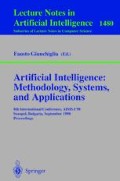Abstract
One of the most interesting puzzles in formalizing belief contexts is the fact that many belief reports can be given both an opaque and a transparent readings. A traditional explanation is that the two readings are related to the failure and success of the principle of substitutivity respectively, and this in turn is explained with the de re/de dicto distinction. We propose an alternative analysis, based on the idea that another agent's beliefs can just be quoted (preserving opacity) or translated into the reporter's language (allowing for transparency). We show that MultiContext systems allow for the formalization of these two phenomena at the same time, thanks to their multi-language feature.
We thank the Mechanized Reasoning Group at DISA (Trento), ITC-IRST (Trento) and DIST (Genoa). This work is part of the MRG project Distributed Representations and Systems (http://www.cs.unitn.it/~mrg/distributed-intelligence/).
Preview
Unable to display preview. Download preview PDF.
References
A. Bonomi. Eventi mentali. Il Saggiatore, 1983.
A. Cimatti and L. Serafini. Multi-Agent Reasoning with Belief Contexts: the Approach and a Case Study. In M. Wooldridge and N. R. Jennings, editors, Intelligent Agents: Proceedings of 1994 Workshop on Agent Theories, Architectures, and Languages, number 890 in Lecture Notes in Computer Science, pages 71–85. Springer Verlag, 1995. Also IRST-Technical Report 9312-01, IRST, Trento, Italy.
G. Frege. über Sinn und Bedeutung. Zeitschrift fur Philosophie und Philosophische Kritik, 100:25–50, 1892. English translation in [12].
C. Ghidini and L. Serafini. Distributed First Order Logics. Technical Report 9804-02, IRST, May 1998. Accepted for presentation at the First International Workshop on Labelled Deduction (LD'98). Freiburg, Germany. September 7–9, 1998.
E. Giunchiglia and F. Giunchiglia. Ideal and Real Belief about Belief. In Practical Reasoning, International Conference on Formal and Applied Practical Reasoning, FAPR'96, number 1085 in Lecture Notes in Artificial Intelligence, pages 261–275. Springer Verlag, 1996.
F. Giunchiglia. Contextual reasoning. Epistemologia, special issue on I Linguaggi e le Macchine, XVI:345–364, 1993. Short version in Proceedings IJCAI'93 Workshop on Using Knowledge in its Context, Chambery, France, 1993, pp. 39–49. Also IRSTTechnical Report 9211-20, IRST, Trento, Italy.
F. Giunchiglia and C. Ghidini. A Local Models Semantics for Propositional Attitudes. In Proceedings of the 1st International and Interdisciplinary Conference on Modeling and Using Context (CONTEXT-97), pages 363–372, Rio de Jeneiro, Brazil, 1997. Also IRST-Technical Report 9607-12, IRST, Trento, Italy.
F. Giunchiglia and C. Ghidini. Local Models Semantics, or Contextual Reasoning = Locality + Compatibility. In Proceedings of the Sixth International Conference on Principles of Knowledge Representation and Reasoning (KR'98), pages 282–289, Trento, 1998. Morgan Kaufmann. Short version presented at the AAAI Fall 1997 symposium on context in KR and NL. Also IRST-Technical Report 9701-07, IRST, Trento, Italy.
F. Giunchiglia and L. Serafini. Multilanguage hierarchical logics (or: how we can do without modal logics). Artificial Intelligence, 65:29–70, 1994. Also IRST-Technical Report 9110-07, IRST, Trento, Italy.
F. Giunchiglia, L. Serafini, E. Giunchiglia, and M. Frixione. Non-Omniscient Belief as Context-Based Reasoning. In Proc. of the 13th International Joint Conference on Artificial Intelligence, pages 548–554, Chambery, France, 1993. Also IRSTTechnical Report 9206-03, IRST, Trento, Italy.
J. Hintikka. Knowledge and Belief. Cornell University Press, Ithaca, NY, 1962.
A. P. Martinich. The philosophy of language. Oxford University Press, 1985.
D. Prawitz. Natural Deduction — A proof theoretical study. Almquist and Wiksell, Stockholm, 1965.
B. Russell. On denoting. Mind, XIV, 1905.
Author information
Authors and Affiliations
Editor information
Rights and permissions
Copyright information
© 1998 Springer-Verlag Berlin Heidelberg
About this paper
Cite this paper
Benerecetti, M., Bouquet, P., Ghidini, C. (1998). Formalizing belief reports — The approach and a case study. In: Giunchiglia, F. (eds) Artificial Intelligence: Methodology, Systems, and Applications. AIMSA 1998. Lecture Notes in Computer Science, vol 1480. Springer, Berlin, Heidelberg. https://doi.org/10.1007/BFb0057435
Download citation
DOI: https://doi.org/10.1007/BFb0057435
Published:
Publisher Name: Springer, Berlin, Heidelberg
Print ISBN: 978-3-540-64993-9
Online ISBN: 978-3-540-49793-6
eBook Packages: Springer Book Archive

